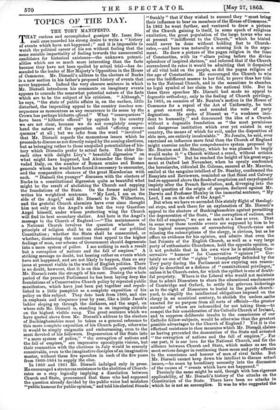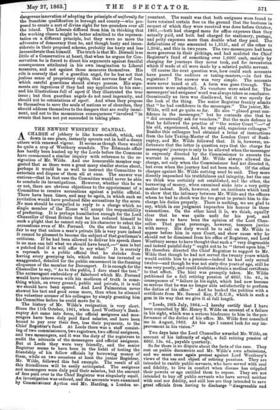TOPICS OF THE DAY.
THE TORY MANIFESTO.
THAT curious and accomplished gossiper Mr. Isaac Dis- raeli once recorded his strong desire to write a " history of events which have not happened ; " and it is impossible to watch the political career of his son without feeling that the same amiable impartiality of feeling towards the unsuccessful candidates for historical existence—the unknown potenti- alities which are so much more interesting than the facts because they have not been spoiled by actual trial—has de- scended to the leader of Her Majesty's Opposition in the House of Commons. Mr. Disraeli's address to the electors of Bucks is a new section in his father's proposed history of events that never happened. Indeed the very obscure sentence in which Mr. Disraeli introduces his comments on imaginary events appears to concede the somewhat potential nature of the facts which are to be the subject of his criticism. "Although," he says, "the state of public affairs is, on the surface, little disturbed, the impending appeal to the country involves con- sequences as momentous as any recurrence to its sense by the Crown has perhaps hitherto offered." What " consequences " have been " hitherto offered" by appeals to the country we are not clear, because we do not completely compre- hend the nature of the operation called ' offering conse- quences' at all ; but we infer from the word "involved" that Mr. Disraeli regards the momentous issues which he proceeds to discuss as not directly raised by the coming elections, but as belonging rather to those unspoiled potentialities of his- tory which Disraelis prefer to actual facts. The elder Dis- raeli cites with delight Livy's " beautiful digression" on what might have happened, had Alexander the Great in- vaded Italy, on the number of Roman armies and Roman generals whom he would have found it necessary to encounter, and the comparative chances of the great Macedonian with each. " Disraeli the younger" discusses with the electors of Bucks in a constitutional digression quite as beautiful what might be the result of abolishing the Church and sapping the foundations of the State. On the former subject he writes his weightiest sentences. " My Lord, I am on the side of the Angel," said Mr. Disraeli to Dr. Wilberforce, and the grateful Church alarmists have ever since thought him not only on the Angel's side but the very Guardian Angel himself, under whose protecting wing the Church will find its best secondary shelter. And here is the Angel's message to the Church of England :—" The maintenance of a National Church involves the question whether the principle of religion shall be an element of our political Constitution ; whether the State shall be consecrated, or whether, dismissing the sanctions that appeal to the higher feelings of man, our scheme of Government should degenerate into a mere system of police. I see nothing in such a result but a corruption of nations and the fall of empires." A. striking message no doubt, but bearing rather on events which have not happened, and arc not likely to happen, than on any issue at present visible in the world of English politics. There is no doubt, however, that it is on this Church question that Mr. Disraeli rests the strength of his case. During the whole period of the present Parliament he has been laying deep the foundations of a Conservative Church policy by repeated public manifestoes, which have just been put together and repub- lished in a little pamphlet as a complete exposition of his policy on this subject. They date back from 1860, and rise in emphasis and eloquence year by year, like a little Jacob's ladder sloping up through the darkness, and the angel, on whose side Mr. Disraeli is, standing in an imposing attitude on the highest visible rung. The great sentence which we have quoted above from Mr. Disraeli's address to the electors of Buckinghamshire must be taken as a general reference to this more complete exposition of his Church policy, otherwise it would be simply enigmatic and embarrassing, even to the most devoted of his followers. Degeneration of the State into " a mere system of police," " the corruption of nations and the fall of empires," are impressive apocalyptic- visions, but their connection with the elections in July would be scarcely conceivable, even to the imaginative disciples of an imaginative master, without these five speeches in each of the five years from 1860-1864 to supply the clue.
In 1860 and 1861 Mr. Disraeli indulged only in prose. He encouraged a strenuous resistance to the abolition of Church- rates as a step logically implying a dissolution between Church and State, pronounced that those who had supposed the question already decided by the public voice had mistaken "public humour for public opinion," and told his clerical friends "frankly " that if they wished to succeed they " must bring their influence to bear on members of the House of Commons." In 1862 he went further, and ventured to draw a picture of the Church gaining to itself, in some epoch of religious exaltation, the great population of the large towns who are at present " indifferent to the Church," which he hinted could never be done without holding fast to Church- rates,—and here was naturally a missing link in the argu- ment. He drew a picture of the pagan religion in the time of Constantine, with its " altars paling before the divine splendour of inspired shrines," and inferred that if the Church surrendered its rates it would be admitting that it despaired of all vital hold on the people, as did the pagan religion of the age of Constantine. He encouraged the Church to win over the indifferent masses to her fold, to prove thus her title to be the National Church, and in the meantime to abandon no legal symbol of her claim to the national title. But in these three speeches Mr. Disraeli had made no appeal to dogmatic orthodoxy, only to the feeling of Church privilege. In 1863, on occasion of Mr. Buxton's motion in the House of Commons for a repeal of the Act of Uniformity, he took a great onward step, and sounded the note of party dogmatism. He spoke of Dissent as "a weakness inci- dent to humanity," and denounced the idea of a Church without a dogmatic foundation as " the most pernicious and dangerous institution which ever yet existed in any country, the means of which for evil, under the disposition of able men, are entirely incalculable." No Jesuits, he said, ever exercised an influence more fatal than the Church of England might exercise under the comprehensive system proposed by Mr. Buxton and Dr. Stanley, which he was pleased to imply would make it " a Church without a creed, without articles or formularies." But he reached the height of his great argu- ment at Oxford last November, when he openly confronted the heresiarchs, ridiculed Dr. Colenso, sneered at Mr. Maurice, smiled at the sanguine intellect of Dr. Stanley, condemned the Essayists and Reviewers, reminded us that Sinai and Calvary had re-appeared above the floods of scepticism and encyclopmdie impiety after the French Revolution, and, diverging into the vexed question of the origin of species, declared against Mr. Darwin and Professor Huxley in the immortal sentence, " My Lord, I am on the side of the Angel."
But when we have re-ascended this stately flight of theologi- cal steps, and seek there for an explanation of Mr. Disraeli's- appeal to the electors of Buckinghamshire against permitting the degeneration of the State, " the corruption of nations, and the fall of empires," we are as much at a loss as ever. That in some way these terrible events are supposed by him to be the logical consequence of surrendering Church-rates and relaxing the subscriptions of the clergy, is obvious, but as he offers no evidence for his opinion, and admits that even the last Primate of the English Church, as well as a very large party of enthusiastic Churchmen, hold the opposite opinion, is. it not probable that in his own view he is mistaking Con- servative " humour " for Conservative " opinion ?" Cer- tainly no one of the " rights " triumphantly defended by the Tory party during the Parliament now expiring can reason- ably be described as a defence of " constitutional privileges," unless it be Church-rates, for which the epithet is one of doubt- ful propriety. Where is the Liberal who would not maintain that to admit Dissenters to share the educational emolumente of Cambridge and Oxford, to settle the grievous bickerings as to the right of Dissenters to burial in the parish church. yard, to simplify the intellectual obligations imposed on the clergy in an uncritical century, to abolish the useless saaths exacted for no purpose from all sorts of officials—the greater number of whom are indemnified for not taking them—to compel the fair consideration of the Catholic Church of Ireland, and to suppress deliberate insults to the consciences of our Catholic fellow-subjects, would be otherwise than the greatest possible advantages to the Church of England ? Yet it is the effectual resistance to these measures which Mr. Disraeli, claims as having prevented the desecration of the State and arrested " the corruption of nations and the fall of empires."„. For our part, it is our love for the National Church, and for the alliance between Church and State, which makes us see the most serious danger in continuing these mean and petty affronts to the conscience and honour of men of rival faiths. But Mr. Disraeli cannot keep down his intellect to discuss actual issues,—he soars by hereditary necessity into the discussion of the causes of " events which have not happened."
Precisely the same might be said, though with less rigorous applicability, of Mr. Disraeli's history of the attacks on the Constitution of the State. There have been no attacks in which he is not an accomplice. It was he who suggested the
dangerous innovation of adopting the principle of uniformity for the franchise qualification in borough and county—who pro- posed to create a sort of divine right for ten-pounders over all the island. The Liberals differed from him in thinking that the working classes might be better admitted to the represen- tation on a different principle, but they were no more the advocates of democracy than he, and though hasty and incon- siderate in their proposed scheme, probably less hasty and less inconsiderate than himself. The truth is that Mr. Disraeli is so little of a Conservative at heart, that when he argues for Con- servatism he is forced to direct his arguments against fanciful consequences attributed in his own imagination to Liberal measures, and not against those measures themselves. His edle is scarcely that of a guardian angel, for he has not that jealous sense of proprietary rights, that nervous fear of loss, which careful guardians should always possess. His argu- ments are ingenious if they had any application to his case; and his illustrations full of esprit if they illustrated the true issue ; but then guardian angels do not need ingenuity, and should not be ostentatious of esprit. And when they propose to themselves to save the souls of nations or of churches, they should address themselves to the dangers that are really immi- nent, and not to the momentous consequences " involved " in events that have not yet succeeded in taking place.



































 Previous page
Previous page